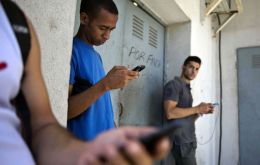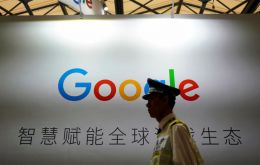MercoPress. South Atlantic News Agency
Tag: Censorship
-
Thursday, May 29th 2025 - 20:05 UTC
Rubio announces visa restrictions for foreigners who exert censorship

The US government is taking action to protect free speech by introducing a new visa restriction policy targeting foreign officials who engage in censorship of protected expression, Secretary of State Marco Rubio announced Wednesday.
-
Tuesday, April 29th 2025 - 10:34 UTC
Bolivian journalists against censorship

The National Association of Journalists of Bolivia (ANPB) and nine departmental journalist associations have rejected Congressional Bill No. 007/2024-2025, titled “Integrity and Public Ethics in Electoral Processes,” currently under review in the Bolivian Senate. Senator Silvia Salame's initiative is criticized for introducing covert censorship and control over media under the guise of ensuring electoral integrity.
-
Wednesday, September 15th 2021 - 09:30 UTC
Brazilian Senate repeals Bolsonaro decree against social media alleged censorship

Brazil's Senate Speaker Rodrigo Pacheco Tuesday repealed a Law-decree issued last week by President Jair Bolsonaro concerning censorship on social media.
-
Wednesday, July 14th 2021 - 09:52 UTC
One demonstrator dead confirmed as only bits of information are known from censorship-gripped Cuba

Following a shut down of access to the internet, Cuba's Interior Ministry confirmed on Tuesday that at least one person died and several others were arrested in the outskirts of capital Havana following Sunday's popular uprising in demand of food, medicines, electricity and freedom.
-
Saturday, October 10th 2020 - 08:51 UTC
Twitter imposing tough new rules ahead of the US presidential election

Twitter is imposing tough new rules that restrict candidates from declaring premature victory and tighten its measures against spreading misinformation, calling for political violence, and spreading thoughtless commentary in the days leading up to and following the Nov 3 US election.
-
Tuesday, June 2nd 2020 - 08:08 UTC
Facebook staff criticize Zuckerberg for leaving Trump’s most inflammatory verbiage unchallenged

Facebook employees walked away from their work-from-home desks on Monday and took to Twitter to accuse Chief Executive Mark Zuckerberg of inadequately policing U.S. President Donald Trump’s posts as strictly as the rival platform has done.
-
Friday, September 27th 2019 - 09:48 UTC
LGBT themed stage show fear subtle censorship of the Bolsonaro administration

After a state-run theater in Brazil suddenly dropped his LGBT-themed stage show “Gritos,” Artur Ribeiro began to worry it was curtains for his company under President Jair Bolsonaro. Ribeiro said the Caixa Cultural theater in the capital of Brasilia last week canceled the show, in which he plays a transgender character.
-
Saturday, September 14th 2019 - 12:08 UTC
Cuban King censor exposed to some of his own medicine by Twitter

Twitter has restored some of the accounts of Cuban state-run media, journalists and government officials it had blocked on Wednesday, although others like that of Communist Party leader Raul Castro remain suspended.
-
Wednesday, June 12th 2019 - 07:44 UTC
Cubans complain about Internet service, too expensive, too slow and censorship

Six months on from the euphoria that greeted full internet access for mobile phones on the communist-run island, frustrated Cubans complain it is too expensive, too slow and crippled by government censorship.
-
Wednesday, November 28th 2018 - 09:20 UTC
Google staff protest Dragonfly, a project with China that helps state surveillance

Staff at Google have called on the search giant to end work on a controversial search engine project for China. Called Dragonfly, the search engine would be a censored version developed with the aid of the Chinese government. In a letter published online 60 employees said the project would only help state surveillance.
